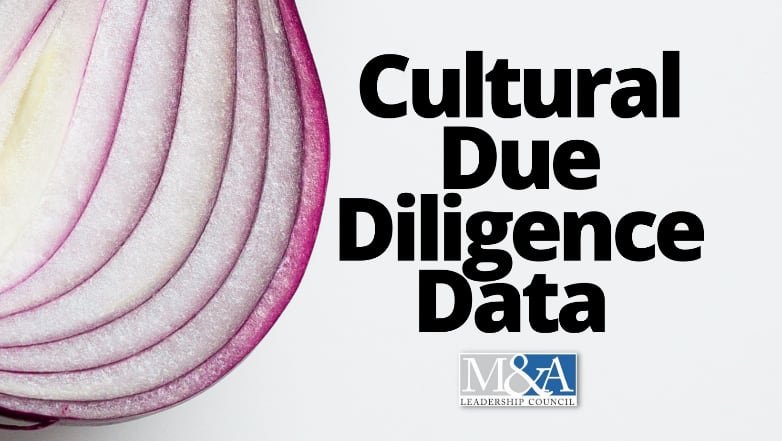Pre-Deal Cultural Due Diligence: Collecting & Analyzing Data
Take a Layered Approach to Understanding the Target’s True Culture
by Mark Herndon, Chairman Emeritus, M&A Leadership Council
Almost every M&A study completed since the beginning of time has consistently determined two key findings.
First, that culture matters; and second, that acquirers are generally ill-equipped at cultural due diligence.
Several competent studies demonstrate the link between culture and deal success or failure; financial performance and ROI; strategic results relative to peer organizations; and even CEO tenure. Fewer studies address the prevalence of any type of meaningful pre-deal cultural due diligence. One such study that we led a few years back determined that out of approximately 15 categories of analysis considered to be “essential” during due diligence, culture ranked dead last in terms of the percentage of acquirers actually conducting this type of inquiry pre-closing.
“Your approach to cultural due diligence should never be a ‘one-and-done’ exercise.”
If you are a serious acquirer, sooner or later you’ll discover on your own the extreme importance of pre-deal cultural due diligence. But the “how to” is a continuing enigma to many. For those organizations that have attended one of “The Art of M&A® for Integration Leaders” training sessions by the M&A Leadership Council, you’ll remember our viewpoint that M&A should be considered to be an end-to-end business process.
Each completed deal goes through a full life cycle of phases, and at each phase there’s a corresponding set of integration-related actions that should be accomplished to “stack the deck for success.” We’ll review the overall M&A life cycle and common definition of culture another time. For now, let’s concentrate on an approach to cultural due diligence that has served us well over the years.
As this downloadable resource, Pre-Deal Cultural Due Diligence, indicates, your approach to cultural due diligence should never be a “one-and-done” exercise. You’ll most likely be limited in what data you can directly access from the target in the early stages; therefore, you have to get what you can when you can and stay at it. Except in extremely unusual and collegial deal negotiations, don’t even think about asking to do a formal cultural assessment of the target until after definitive agreement, and most likely, you won’t be able to get to this step until soon after closing.
We like the metaphor of peeling an onion, since you typically need to go through a few different tactics and layers before you are able to confidently understand the target’s true culture, risks, flashpoints and implications for integration. Starting with indirect and informal assessment methods during the early stages of the lifecycle, and progressing to more direct and more formalized assessments later on, here are a few things we suggest for your consideration.
Strategy & Targeting Stage
Conduct a cultural baseline assessment of your own organization now. You won’t be able to take time for this once a live deal begins. Establish cultural target screening criteria and a process to avoid spending time on deals with higher risk profiles. Provide your corporate development team and senior executives with a short-list of the most important green-light / red-light type of cultural indicators to be aware of early on in preliminary exploratory conversations. Maximize the use of public and third-party data, as well as general insights you can glean from former employees, customers or vendors without tipping your hand.
Due Diligence Stage
By necessity, cultural due diligence is almost always a “second wave” due diligence item, that only gets launched after the core strategic, financial, legal and other business analysis indicates there are no immediate “show-stopper” issues. Make sure your checklists have the right culture-related due diligence requests including things like the target’s employee opinion data, employment value proposition, communication samples, key work-life policies and the like. But the most important culture data can only be obtained by direct observation, dialogue with key executives or deal-team members and validation sessions with other target company staff as they get brought into the deal.
We strongly suggest the use of structured interviews with key target company staff, and once the deal-points are mostly resolved, some target companies will permit limited culture surveys to be administered to the limited number of executives or deal-team members who are actively involved in the deal and under NDA. Understandably, at this stage most target companies will be hypersensitive to revealing any data or insights which might negatively impact the transaction or the go-forward role of key people.
Integration Planning & Execution Stage
Culture is a highly recommended priority item for the acquirer’s executive team to discuss during the Game Day Strategy Summit. After the initial public announcement, and once the full pre-close integration planning process is underway, it has been our experience that most target companies will then permit broader access to integration team members, function leads and formal cultural assessments.
You can probably predict what my final caution is. Don’t get so wrapped up in the background documentation or with conducting a formal assessment that you overlook the far more important step of working with leaders to define what the ideal future culture should be in order to maximize business results. It is far more important to actively engage with executives and key leaders in defining the desired high-performance cultural attributes of the combined business and aligning the organization around those objectives than merely comparing and contrasting previous cultural norms.
Learn more about assessing a Target’s culture at our next two upcoming events:
The Art of M&A® for Due Diligence Leaders / In-Person – Boston, Sept 12-14, 2023
The Art of M&A® for Integration Leaders / In-Person – San Diego, Oct 11-13, 2023
See our Training Calendar for all upcoming courses in 2023.






